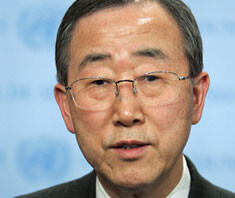United Nations News Service 19 March 2007

UN Secretary-General Ban Ki-moon. (Photo: UN Photo/Evan Schneider)
United States Secretary of State Condoleezza Rice, Russian Foreign Minister Sergei Lavrov, Foreign Minister Frank-Walter Steinmeier of Germany, current president of the European Union (EU), High Representative for European Foreign and Security Policy Javier Solana and European Commissioner for External Relations Commissioner Benita Ferrero-Waldner took part in the consultations of the Quartet, which come ahead of Mr. Ban’s own visit to the region.
Ever since Hamas won elections early last year and formed a Government, Israel stopped handing over tax and customs revenues it collects on behalf of the Palestine Authority, and international donors suspended direct aid, calling on Hamas, which rejects Israel’s right to exist, to commit to non-violence, recognize Israel and accept previously signed agreements between Israel and the Palestinians.
The Quartet, which champions the Road Map peace plan of a two-State solution to the conflict, has reiterated these three principles several times since Palestinians reached an agreement in Mecca, Saudi Arabia, last month to form a unity government of both Hamas and Fatah, which led the government when previous accords with Israel were signed.
On his trip to the region beginning this week, Mr. Ban will visit Egypt, the Occupied Palestinian territory, Israel and Jordan, and attend the Arab League Summit in Riyadh, Saudi Arabia, on 28 March, before going on to Lebanon. He will be back at UN Headquarters in New York on 2 April.
“The Secretary-General believes that we are seeing a renewed dynamism in diplomacy in the Arab world,” Mr. Ban’s spokesperson, Michele Montas, told a new briefing today, adding that his main priorities for the trip will be the Middle East Peace process, stability in Lebanon, the Darfur and the UN role within the Iraq Compact.
“The UN has had crucial political and operational roles in the Middle East for over 60 years,” she said, stressing that the region is high on Mr. Ban’s agenda. “The Secretary General wants to see first hand the UN peace operations and presences in the region. He also wants to hear first hand from the people in the region the problems and challenges they face,” she added.
At the Riyadh summit, he wants to express his support to ongoing efforts to re-energize the Middle East peace process and bring about peace and stability in Lebanon, Iraq, and in the broader Middle East context, she said.
Related Links